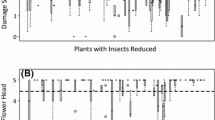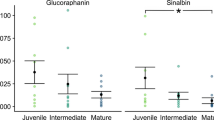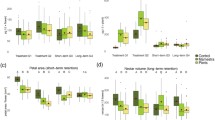Abstract
To understand the evolutionary and ecological consequences of natural enemy damage to plants, it is essential to determine how the fitness effects of damage differ depending on the tissues damaged and the subsequent pattern of damage. In a field experiment with the ivyleaf morning glory, the direct and indirect effects on fitness of herbivore damage to cotyledons and mature leaves was evaluated. Damage to mature leaves had negligible direct effects on fitness and no indirect effects on fitness through other correlated traits. Damage to cotyledons also did not directly affect fitness, but did so indirectly through its effects on plant size. These findings suggest that increased resistance to cotyledon damage or increased compensatory growth following cotyledon damage could be effective strategies for plants of this species to counteract the negative effects of herbivory.
Similar content being viewed by others
Author information
Authors and Affiliations
Corresponding author
Additional information
Electronic Publication
Rights and permissions
About this article
Cite this article
Stinchcombe, J.R. Fitness consequences of cotyledon and mature-leaf damage in the ivyleaf morning glory. Oecologia 131, 220–226 (2002). https://doi.org/10.1007/s00442-002-0871-2
Received:
Accepted:
Published:
Issue Date:
DOI: https://doi.org/10.1007/s00442-002-0871-2




